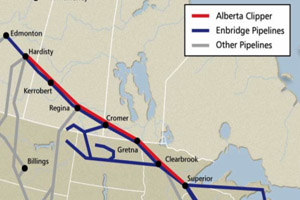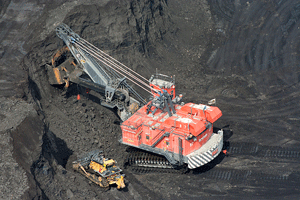A Canadian oil giant wants to expand an already-massive pipeline to bring oil from the tar sands of Canada all the way down to the Gulf of Mexico. The US has yet to even approve the 1,980-mile TransCanada Keystone XL pipeline, but the company is already sending threatening letters to landowners in their pathway.
In a letter sent last month to a landowner in Nebraska provided to Mother Jones, the company warns that the landowner could be forced to surrender his or her property if the landowner doesn’t consent to the pipeline construction on their property. The company invokes a Nebraska state statute to threaten eminent domain should homeowners turn down their offer of financial compensation for agreeing to let the pipeline cross their land:
In order to construct the pipeline, Keystone must acquire a permanent and temporary easement over your property. It is Keystone’s strong preference to negotiate a voluntary transfer with each property owner. However, in the event we cannot come to an agreement, Keystone will use eminent domain to acquire the easement, which is authorized pursuant to Nebraska Revised Statute 57-1101 et. Seq.
The letter goes on to offer a price to the landowners, which has been blacked out. It warns that this is the final letter, and gives the landowner just one month to respond. The company also offers to “provide compensation for any damages that occur during the course of construction including crop loss and any damages to fences, trees, or other improvements.”
In case the landowner didn’t get the threat the first time, the threat is repeated:
While we hope to acquire this property through negotiation, if we are unable to do so, we will be forced to invoke the power of eminent domain and will initiate condemnation proceedings against this property promptly after the expiration of this one month period.
This letter comes despite the fact that the project isn’t even approved yet; in July, the State Department extended the review period for the pipeline by 90 days to give federal agencies additional time for comment. People who live in the region are justifiably outraged by the bullying from TransCanada before the oil giant even has the green light on the project.
The pipeline from Hardisty, Alberta, to Houston would pass through Montana, South Dakota, Nebraska, Kansas, Oklahoma, and Texas. It has been the subject of plenty of debate already, and even more so in the wake of the giant oil disaster in the Gulf. Then there was yet another oil spill in Michigan last month, one that dumped hundreds of thousands of gallons of crude from the tar sands into the Talmadge Creek. That pipeline belongs to TransCanada rival Enbridge Energy, and certainly hasn’t helped the public feel much better about the Keystone XL project (more on that here).
Environmental groups and the US EPA have raised concerns about the large amount of emissions from tar sands oil as compared to conventional sources. But there’s a growing concern about the safety of the pipeline, which would cross 71 rivers and streams and the Ogalalla aquifer if it is completed.
The full letter, which was obtained by the National Wildlife Federation, is here.















